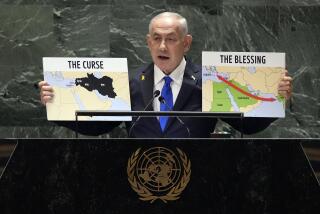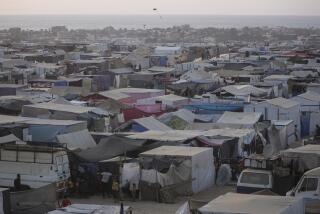Iraqi Radio Proclaims a ‘Victory’
- Share via
AMMAN, Jordan — Iraqi President Saddam Hussein maintained his tight veil of secrecy and control over a war-ravaged nation on Thursday, proclaiming that President Bush had ordered a halt in hostilities only after Iraq’s Republican Guard had “broken the backbone” of the coalition in fierce combat near Basra.
In broadcasts throughout the day, Hussein’s state-run Baghdad Radio declared that the Iraqi regime was “happy for the halt in fighting, which will save the blood of our sons,” and it insisted that “the mother of battles” had ended after a “great showdown.”
But, amid occasional gun bursts of celebration and relief throughout the Iraqi capital, at no point did the Iraqi leader tell his 18 million people of their tens of thousands of dead and captured compatriots from a lightning battle that, in reality, had left their nation’s army and economy all but shattered.
In fact, Hussein’s military spokesman asserted that Iraq’s Republican Guard actually had driven all allied forces back beyond Iraq’s southern border before the fighting stopped, and it condemned the United States for continuing to violate Iraqi airspace through overflights.
Exhorting Iraqis to relish their “victory,” the regime’s announcer declared: “The (Republican) Guards have broken the backbone of their aggressors and thrown them beyond the borders. Let us celebrate the epic of the brave Republican Guard, who protected Iraq and preserved its great power.”
In a later commentary that appeared to telegraph future justifications for Iraq’s heavy losses, Hussein’s military spokesman stated: “Victory is not how many tanks or planes we or the enemy used. . . . Victory is the face that you acquire in the history books.”
And Hussein used his other remaining tools of propaganda and public image building, among them his ruling Arab Baath Socialist Party newspaper, Al Thawra, to lay the groundwork for putting the best possible historic face on his failed experiment in Kuwait.
“Iraq’s power remains intact,” the newspaper declared in a front-page editorial that did not mention allied claims of more than 40 Iraqi divisions disabled in the conflict. The editorial concluded that Hussein deserved praise for what it called “a great Arab achievement.”
On its evening news program, Baghdad Radio reported that Hussein had, indeed, received a telegram of praise from a group it identified as the Saudi National Liberation Front. And several times during the day, the broadcasts reported that a death ship carrying the bodies of 220 U.S. servicemen killed during the war had landed in Valencia, Spain.
Aside from the obvious goal of shielding his own people from the horrible realities of the war seen by most of the outside world, the broadcasts were a clear sign that Hussein is endeavoring to show that he retains full control over his ruling clique and his party.
During the six-week aerial bombardment of Iraq, the allies managed to demolish many of Hussein’s key levers of power and control. Cruise-missile strikes knocked out all broadcast capability of his regime’s state-run national television network. Laser bombs destroyed every major public telecommunications facility in the country. Other air strikes crippled several of Hussein’s strategic command and control links to his military.
But the allies never managed to destroy or effectively jam Baghdad Radio. Experts on Iraq said that its broadcasts, combined with Iraq’s highly centralized command structure, have permitted Hussein to remain in firm control of the nation, at least in the eye of the public.
“He’s now making his case to his people, to prepare them for the battlefield reports they’re bound to hear when the bodies and prisoners start coming back,” said one Western diplomat who was based in Baghdad until late last year. “But more importantly, he’s telling his people he’s still in charge, which means they better accept his version of events or else.”
The “or else” was a clear reference to Hussein’s extensive, Draconian party-based internal security apparatus, the Mukhabarat. The nationwide network of largely civilian agents is under Hussein’s direct command and has been fiercely loyal to him, a loyalty reinforced by frequent executions.
Western journalists now visiting Baghdad, who usually are accompanied by government guides and can file dispatches only under strict Iraqi censorship, have said privately that the Mukhabarat structure appears to be intact throughout the Iraqi capital.
Most interviews in Baghdad’s streets or marketplaces are closely watched by civilian agents, whose mere presence produces comments from shopkeepers or shoppers that are consistent with the prevailing line of the ruling regime. And it is from the regime’s radio station that most Iraqis are receiving that official line.
When the day’s broadcasting opened on Thursday, it was clear to most observers just what tone the Iraqis will likely take for days or weeks to come. “This is Baghdad, the voice of dignity and pride, the voice of justice and force,” declared the announcer’s cheery voice just after sunrise. “This is Baghdad, which fears only God. Baghdad will not bow its head to any arrogant person, no matter how tyrannical and oppressive he might be.
“From Baghdad, the graveyard of the criminal invaders, good morning.”
More to Read
Sign up for Essential California
The most important California stories and recommendations in your inbox every morning.
You may occasionally receive promotional content from the Los Angeles Times.










